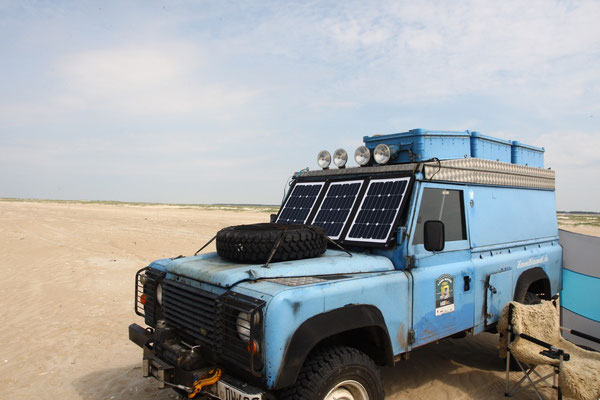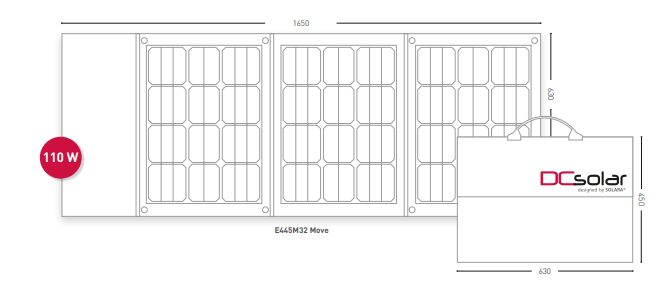
If you are planning a longer voyage offshore, the question of how to charge your batteries to keep your electronics running is of paramount importance. Instead of running the engine for several hours each day, many boats opt for quieter, greener alternatives such as fuel cells, hydro-generators, wind turbines and solar panels. Solar or Photovoltaic (PV) panels have obvious advantages on a sailing yacht: no additional fuel to carry and no moving parts.
But maybe you only occasionally spend nights away from a marina? Or maybe your batteries just need a little top-up to get through the day. Plastering all available surfaces in solar cells may be impractical or prohibitively expensive. Instead, a portable solar panel might be just the ticket!
SOLARA
SOLARA was founded in Hamburg 1996 and in classic startup style, operated initially out of the founder’s living room & garage. The company quickly grew and is now a leading brand in the world of small scale solar for homes, campers and yachts. They boast over 25 years of experience and hold that elusive accolade of German Quality Engineering.

DCsolar Power Move
DCsolar is a trademark of SOLARA, offering PV panels of the same quality design and engineering but at a lower price point due to production in Asia. Mobile solar modules are a key part of their range, including the Power Move which is a 3-panel folding system for easy deployment in a temporary setting.

The system features eyelets around the edge for connecting on deck or to your tent / camper. When folded, the product forms a slim, compact unit with carry handle.
Power output
The power consumption of a sailing boat varies greatly from vessel to vessel, and even from one moment to another, depending on the number of electrical devices in use. If you are planning a long passage it’s important to understand the energy use profile of your boat and how you can balance this with power generation. Total consumption can be estimated by adding up the operating power of each device and estimating the hours of usage each day. Alternatively, nothing can beat real life data and recording your energy consumption when out sailing.
That topic is really beyond the scope of this blog, but lets look at some ballpark figures for illustration.
Hydro-generator manufacturer Save Marine, quotes a typical daily power usage for coastal navigation of over 1000 Watt hours (Wh). This includes a basic navigation system, chart plotter, nav lights and some domestic elements like a fridge. This can easily double or triple as more navigation equipment / domestic appliances are added. (source: https://www.save-marine.com/en/electricity-cruising-sailboat)
The DCsolar Power Move has a stated daily output of 440Wh, based on a typical summer day in Germany.
So clearly this mobile solar module is unlikely to cover your daily demand. But, if that’s what you need then probably a fixed installation is the way to go. The portable option really comes into play as a method to top up your batteries and extend the time before a full charge is needed. If your current battery capacity doesn’t quite meet your typical daily demand and you find yourself running the engine towards the end of the day, then this might just allow you to reach the next charging point without burning extra diesel.
Thanks to its portability, you can easily deploy on deck in a suitable location depending on whether you are sailing or at anchor and where there is sunlight. Look for a spot in the sun such as the coachroof, guardrails, foredeck, or on top of a spray hood or bimini.
Connectivity
The DCsolar Power Move comes with an optional charge controller which regulates the output and offers a simple plug for a cigarette lighter socket.
In cars and campervans this allows the unit to be plugged in directly to the 12V socket and charge the battery that way. In many cases this will also be possible on board your boat as long as you do not exceed the fuses or the wiring for the 12V socket.
Alternatively, you may choose to integrate a dedicated charging socket it in a more rigorous fashion.
Conclusion
Solar power has many advantages on a yacht but a full-blown installation may not be appropriate for all. Portable solar panels offer a simple, cost effective, modular solution with little or no installation required. Adding 1 or 2 of these devices might just be enough to keep your batteries topped up and get you through a day sailing without having to run your engine.
If you have any questions about the DCsolar Power Move, email us at support@upffront.com or click the link below:



